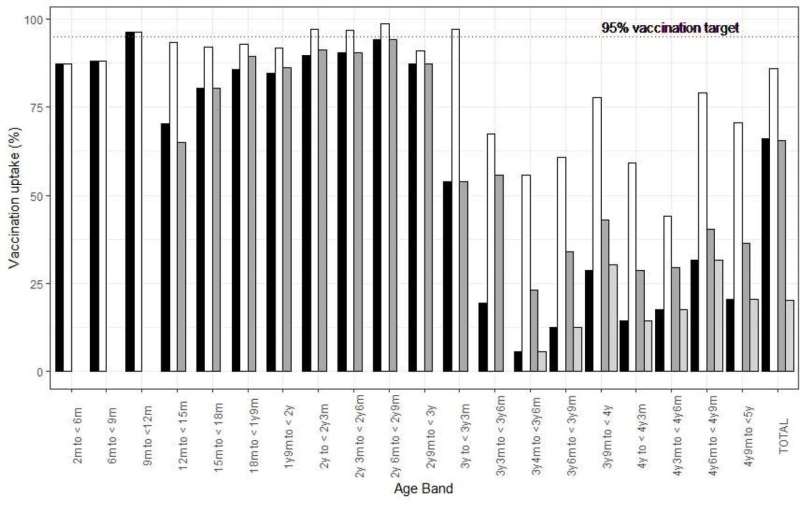
A third of children under 5 attending a Pediatric Emergency Department (PED) and who are eligible for pre-school boosters have unmet vaccination need according to research from Lancaster Medical School.
The study published in BMJ Open examined the percentage of children aged between 2 months and 5 years who were up-to-date with their routine childhood vaccinations at their time of attendance at the Pediatric Emergency Department (PED) at North Manchester General Hospital (NMGH)—part of Manchester University NHS Foundation Trust (MFT)—in October 2021.
Children and young people in Manchester have lower than average levels of health and well-being, around a third live in relative low-income households, and 1% are in care.
Looking at tetanus and measles, mumps, and rubella (MMR) vaccination (as a proxy for overall vaccination status), researchers found that a third of children under 5 were missing at least one dose.
The study was led by Professor Rachel Isba who is a Professor of Medicine at Lancaster Medical School, an NHS Consultant in Pediatric Public Health Medicine for Alder Hey Children’s Hospital in Liverpool, and an Honorary Consultant in Pediatric Public Health Medicine at Royal Manchester Children’s Hospital—also part of MFT.
The study found that in older age groups, many children were missing their tetanus boosters and only one in five of those eligible had received two doses of MMR. Those in younger age groups had vaccination coverage levels comparable to the local data, but still below the target of 95%.
Professor Isba said, “Vaccine-preventable diseases can be very serious and measles cases are on the increase. Those children eligible for pre-school boosters—tetanus and MMR2—appear to have considerable unmet vaccination need. A hospital attendance provides an opportunity to check the vaccination status of children and young people.”
William Roberts, CEO of the Royal Society for Public Health, said, “This really important piece of research highlights that we must use every opportunity to support children and families to access vaccinations so that we can reach the coverage levels needed to protect communities.
“Children and young people have told RSPH that vaccines are important to their health, and so it is up to us to act collectively, ensuring children and families from all backgrounds can have their vaccination needs met. We know that people have vaccines if they are easily accessible and that is why initiatives like ‘Grab-a-jab’ are so successful at reaching a wide range of communities.”
Professor Isba said, “There are pockets of children with very low MMR vaccine coverage who are therefore at high risk of illness. Whilst the pandemic has had an impact, the observation that MMR2 uptake is considerably lower than tetanus booster when they are scheduled together warrants further investigation.
“Catch-up campaigns for MMR should include a focus on this cohort of children (who are now around six years old) and attendance at the Pediatric Emergency Department may offer an opportunity for us to offer an intervention.”
Dr. Helen Wall, Clinical Director for Population Health, NHS Greater Manchester Integrated Care, said, “Measles, mumps and rubella are highly infectious diseases. They can make children extremely ill and lead to health complications such as deafness, fits and brain damage. Vaccinations are thoroughly tested and are one of the most important things we can do to protect ourselves, our children and those around us against ill health.
“It is never too late to catch up on any missed doses of MMR vaccination. You can contact your GP to check whether your child is up to date with their vaccinations and book an appointment.”
More information:
Rachel Isba et al, Unmet vaccination need among children under the age of five attending the paediatric emergency department: a cross-sectional study in a large UK district general hospital, BMJ Open (2023). DOI: 10.1136/bmjopen-2023-072053
Journal information:
BMJ Open
Source: Read Full Article